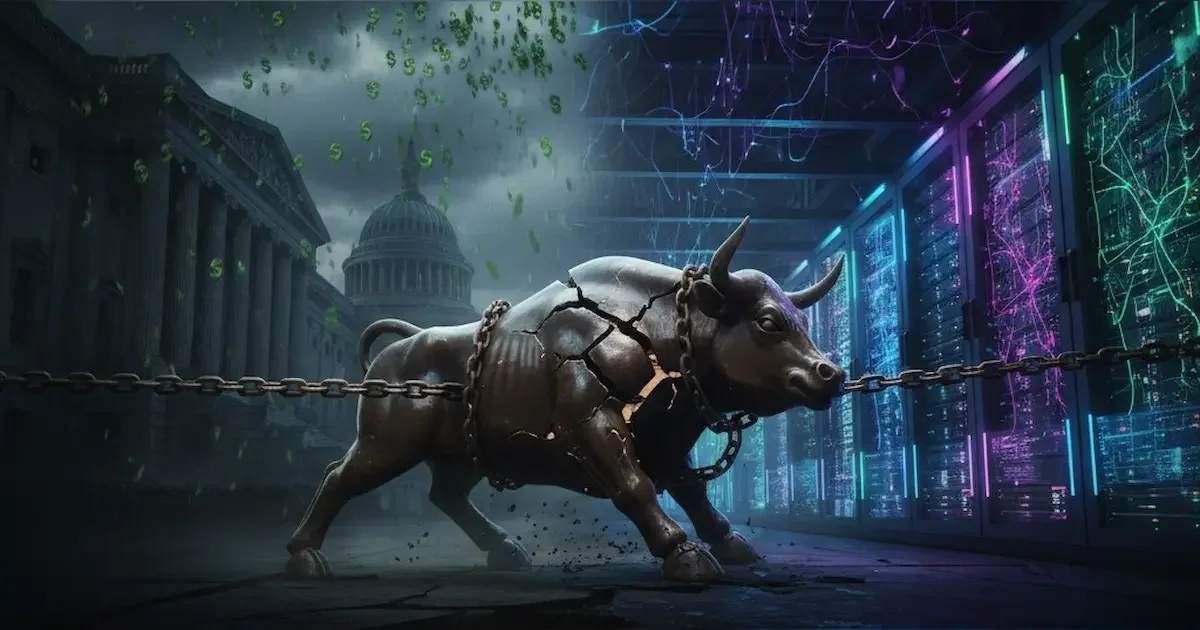The Two-Headed Dragon Wreaking Havoc on Your Portfolio: US Policy & AI Mania
Look, let's cut the crap. If you’ve been watching the Sensex and Nifty gyrate like a drunk uncle at a wedding recently, you’re probably looking for a simple villain. Bad corporate earnings? Monsoon forecasts? The usual suspects?
Nope. The truth is, your money is currently caught in the crossfire of a global battle between two seemingly unrelated, yet deeply intertwined, forces. Think of it as a two-headed dragon. One head is a bunch of grey-suited politicians in Washington D.C. making policy decisions that ripple across the globe. The other head is a gaggle of hoodie-wearing tech geniuses in Silicon Valley building AI so fast it’s making everyone dizzy with both excitement and terror.
And you, the Indian investor, are standing right in the middle, probably wondering why your perfectly good mutual fund SIP is suddenly having a nervous breakdown.
Head #1: The Washington Whirlwind
For decades, we’ve been told a simple story: when America sneezes, the world catches a cold. Well, America is currently having a full-blown allergy attack, and the Indian market is feeling it.
It’s not just about who is in the White House. It's about a series of sledgehammer policy moves that are shaking the foundations of global trade. We’re seeing sudden tariff threats on everything from pharma to IT services. One day, H-1B visa rules are stable; the next, a proposed fee hike sends our entire IT sector into a tailspin.
Why should you care? Because a huge chunk of the revenue for our biggest blue-chip companies—the Infosys, the TCS, the Sun Pharmas of the world—comes from the US. When a politician in America decides to play hardball to protect local jobs or industries, it’s not just a news headline. It's a direct hit on the profits of companies that form the backbone of our stock market. The resulting panic selling you see isn't based on the company's performance yesterday; it's based on fear of a policy tomorrow.
This creates a market that doesn't trade on fundamentals, but on sentiment. It's a market held hostage by political whims 13,000 kilometres away. And trying to predict that is like trying to predict the plot of a terrible Bollywood movie—pointless and exhausting.
Head #2: The Artificial Intelligence Adrenaline Shot
Now for the other, more glamorous head of the dragon: Artificial Intelligence.
AI isn’t new, but the current frenzy is something else entirely. It’s the dot-com bubble on steroids, laced with existential dread and trillion-dollar valuations. Every company is now an "AI company." Your boring old bank? It's using "AI-powered predictive analytics." The food delivery app on your phone? It’s leveraging "hyper-intelligent logistics networks."
Some of this is revolutionary. A lot of it is bullshit.
The problem is, the market can’t tell the difference yet. So, we have a situation where a handful of global tech giants (think Nvidia, Microsoft, etc.) have their stocks pumped to absurd levels because they’re selling the shovels in this AI gold rush. Their soaring valuations pull up global markets, including ours. A good day for Nvidia often means a good opening for the Indian tech sector.
But this is adrenaline, not health. It creates insane volatility. One rumour of a new AI chip can send semiconductor stocks soaring. One failed AI demo can cause a sell-off. We are pinning our financial hopes on a technology that is evolving so rapidly that even its creators don't fully understand where it's headed.
This isn’t investing; it’s high-stakes gambling on a future that hasn't been written yet. And when the hype inevitably cools, or when the market realizes that not every company with "AI" in its press release is the next big thing, the correction will be brutal.
So, How Do You Not Lose Your Shirt?
When you're facing a two-headed dragon, you can't just focus on one head. You have to understand the beast as a whole.
- Stop Reacting to Noise: The daily news cycle is your enemy. A US policy announcement will cause panic. An AI breakthrough will cause euphoria. Both are temporary. Your job is not to react to the tweet, but to understand the underlying strength of the business you're invested in. Does it have a solid domestic market? Is its business model resilient enough to withstand a trade spat?
- Differentiate Hype from Reality: Be brutally sceptical of the AI narrative. Is the company actually using AI to create a real product that solves a real problem and makes real money? Or is it just sprinkling AI jargon on its annual report to attract investors? The former is an investment; the latter is a lottery ticket.
- Remember India: While the world sneezes, the Indian domestic consumption story remains one of the most compelling narratives out there. The US and AI are powerful external forces, but they don’t negate the internal engine of our own economy. Sometimes the best opportunities are right here, far from the chaos of Washington and Silicon Valley.
Ultimately, the market is a reflection of human emotion. And right now, it’s swinging wildly between the fear generated by politicians and the greed generated by technologists. Your job is to ignore the mood swings and focus on what’s real, what’s valuable, and what will still be standing long after the noise has died down. Don't get burned by the dragon's fire.
